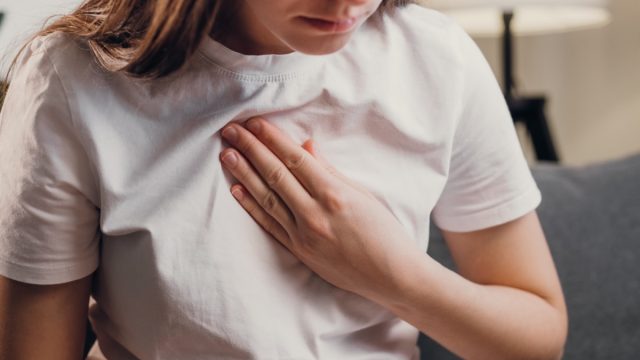15-Year-Old Girl Suffers First-Ever Vocal Paralysis From COVID in Teens

Complications with any illness can be frightening, not to mention unpredictable. But with COVID, which is still a relatively new virus, complications can be extra harrowing—especially when it’s something we haven’t seen before. Now, one 15-year-old has found herself in the “first-ever” category, as she’s the first adolescent to suffer vocal cord paralysis, per a press release from Massachusetts Eye and Ear Infirmary. The case was outlined in a Dec. 19 report published in Pediatrics, which detailed the “otherwise healthy” teen’s condition.
RELATED: 2 COVID Symptoms Now Tied for Most Common Virus Signs, Doctors Say.
The 15-year-old went to the emergency room at Massachusetts General Hospital “with symptoms of respiratory distress,” the press release states. Per the case report, she had difficulty breathing (dyspnea), rapid breathing (tachypnea), and a noisy, high-pitched sound when breathing (stridor).
The patient told doctors that while her COVID symptoms (congestion, fever, and fatigue) resolved after about five days, nine days after her positive COVID test, she started experiencing dyspnea. When her condition didn’t improve in the following days, she went to the hospital.
After an examination, doctors discovered that she had bilateral vocal cord paralysis, which causes a loss of mobility in the larynx. While there have been reports of this complication in adults, this is the first case of vocal cord paralysis in an adolescent after COVID.
“Given how common this virus is among children, this newly recognized potential complication should be considered in any child presenting with a breathing, talking or swallowing complaint after a recent COVID-19 diagnosis,” lead author Danielle Reny Larrow, MD, a resident in the Department of Otolaryngology-Head and Neck Surgery at Mass Eye and Ear, said in the release. “This is especially important as such complaints could be easily attributed to more common diagnoses such as asthma.” (Per the case study, the teenager did report a history of both asthma and anxiety.)
Vocal cord paralysis may be a neuropathic (nervous-system related) complication of the COVID-19 virus, the release said. In the teenager’s case, doctors identified the condition as a “downstream effect” of COVID after testing couldn’t identify another cause. According to the release, the teenager underwent several diagnostic tests, including bloodwork, imaging, cerebrospinal fluid analysis, and consults with professionals from several medical disciplines.
RELATED: Doctor Reveals COVID Symptoms in Patients Who Haven’t Gotten a Booster.
Speech therapy didn’t resolve the patient’s breathing issues, leading doctors to perform tracheostomy, a process where they surgically create an opening in the windpipe. The teenager was dependent on the tracheostomy for well over a year, “suggesting that this type of nerve complication may not be temporary,” the release reads. However, the tracheostomy was removed 15 months after it was inserted—in time for some milestone events.
“She was having her senior prom a year and a quarter to the date of when she lost her function, and she told me she was not going to go to the prom with her tracheostomy in place,” senior author Christopher Hartnick, MD, director of the Division of Pediatric Otolaryngology and Pediatric Airway, Voice, and Swallowing Center at Mass Eye and Ear, said in the release. “We decided to intervene so that she could graduate high school and go to her prom tracheostomy-free, which she did.”
While post-viral neuropathy is known to cause vocal cord paralysis, and paralysis of one or both vocal cords has been reported in adults following a COVID infection, this serious complication isn’t anticipated to happen in “young, healthy” patients. According to study authors, with over 15 million reports of pediatric COVID infections, this isn’t a case that should be ignored.
“To have a young, healthy, vibrant high schooler all of a sudden lose one of their important cranial nerves such that they can’t breathe is highly unusual and took some parsing,” Hartnick said. “The fact that kids can actually have long term neurotrophic effects from COVID-19 is something that it’s important for the broader pediatric community to be aware of in order to be able to treat our kids well.”
RELATED: For more up-to-date information, sign up for our daily newsletter.
Best Life offers the most up-to-date information from top experts, new research, and health agencies, but our content is not meant to be a substitute for professional guidance. When it comes to the medication you’re taking or any other health questions you have, always consult your healthcare provider directly.